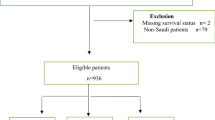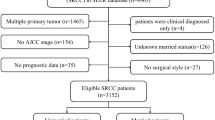Abstract
Objective
Marital status has been found as an independent prognostic factor for survival in colorectal cancer (CRC). However, it is unclear whether patients with different marital status have benefited the same from the treatment improvement.
Methods
We queried the Surveillance, Epidemiology, and End Results (SEER) 9 database for patients diagnosed with CRC from 1975 to 2009. Yearly survival data was presented with overlying loess smoothing lines, stratifying by marital status. We further referred to the SEER 18 database for patients diagnosed with CRC from 1973 to 2014. We also performed yearly data for stage proportion, surgery-performed rate, cancer-specific survival (CSS), and multivariate hazard ratio with overlying loess smoothing lines across all marital status.
Results
Five-year CSS of married, single, and separated/divorced patients showed remarkable increase since 1975; however, survival of widowed patients remained low and no survival gains were observed since 1990. The same trends persisted after stratifying patients by stage and gender. Married and widowed patients tended to have more localized disease and less distant disease compared with the other two groups, and married patients were more likely to receive surgery. Multivariate analysis revealed the hazard ratio of widowed patients dropped dramatically when including age at diagnosis.
Conclusions
Widowed patients have not benefited substantially from the remarkable treatment improvement over the past four decades, which may be the result of the older age of this particular group. This study is a wake-up call to the medical community for additional care for the widowed patients.





Similar content being viewed by others
References
Siegel RL, Miller KD, Jemal A (2017) Cancer statistics, 2017. CA Cancer J Clin 67(1):7–30. https://doi.org/10.3322/caac.21387
Mitry E, Bouvier AM, Esteve J, Faivre J (2005) Improvement in colorectal cancer survival: a population-based study. Eur J Cancer (Oxford, England : 1990) 41(15):2297–2303. https://doi.org/10.1016/j.ejca.2005.01.028
Arnold M, Sierra MS, Laversanne M, Soerjomataram I, Jemal A, Bray F (2017) Global patterns and trends in colorectal cancer incidence and mortality. Gut 66(4):683–691. https://doi.org/10.1136/gutjnl-2015-310912
Siegel RL, Miller KD, Fedewa SA, Ahnen DJ, Meester RGS, Barzi A, Jemal A (2017) Colorectal cancer statistics, 2017. CA Cancer J Clin 67(3):177–193. https://doi.org/10.3322/caac.21395
Kaplan RM, Kronick RG (2006) Marital status and longevity in the United States population. J Epidemiol Community Health 60(9):760–765. https://doi.org/10.1136/jech.2005.037606
Ikeda A, Iso H, Toyoshima H, Fujino Y, Mizoue T, Yoshimura T, Inaba Y, Tamakoshi A (2007) Marital status and mortality among Japanese men and women: the Japan Collaborative Cohort Study. BMC Public Health 7:73. https://doi.org/10.1186/1471-2458-7-73
Aizer AA, Chen MH, McCarthy EP, Mendu ML, Koo S, Wilhite TJ, Graham PL, Choueiri TK, Hoffman KE, Martin NE, Hu JC, Nguyen PL (2013) Marital status and survival in patients with cancer. J Clin Oncol Off J Am Soc Clin Oncol 31(31):3869–3876. https://doi.org/10.1200/jco.2013.49.6489
Uchino BN (2006) Social support and health: a review of physiological processes potentially underlying links to disease outcomes. J Behav Med 29(4):377–387. https://doi.org/10.1007/s10865-006-9056-5
Molloy GJ, Stamatakis E, Randall G, Hamer M (2009) Marital status, gender and cardiovascular mortality: behavioural, psychological distress and metabolic explanations. Soc Sci Med(1982) 69(2):223–228. https://doi.org/10.1016/j.socscimed.2009.05.010
Chang SM, Barker FG 2nd (2005) Marital status, treatment, and survival in patients with glioblastoma multiforme: a population based study. Cancer 104(9):1975–1984. https://doi.org/10.1002/cncr.21399
Jatoi A, Novotny P, Cassivi S, Clark MM, Midthun D, Patten CA, Sloan J, Yang P (2007) Does marital status impact survival and quality of life in patients with non-small cell lung cancer? Observations from the mayo clinic lung cancer cohort. Oncologist 12(12):1456–1463. https://doi.org/10.1634/theoncologist.12-12-1456
Nelles JL, Joseph SA, Konety BR (2009) The impact of marriage on bladder cancer mortality. Urol Oncol 27(3):263–267. https://doi.org/10.1016/j.urolonc.2008.04.016
Denberg TD, Beaty BL, Kim FJ, Steiner JF (2005) Marriage and ethnicity predict treatment in localized prostate carcinoma. Cancer 103(9):1819–1825. https://doi.org/10.1002/cncr.20982
Zhang W, Wang X, Huang R, Jin K, Zhangyuan G, Yu W, Yin Y, Wang H, Xu Z, Sun B (2017) Prognostic value of marital status on stage at diagnosis in hepatocellular carcinoma. Sci Rep 7:41695. https://doi.org/10.1038/srep41695
Li X, Liu Y, Wang Y, Ruan C, Wang H, Liang X, Sun Y, Hu Z (2017) The influence of marital status on survival of gallbladder cancer patients: a population-based study. Sci Rep 7(1):5322. https://doi.org/10.1038/s41598-017-05545-0
Zhang J, Gan L, Wu Z, Yan S, Liu X, Guo W (2017) The influence of marital status on the stage at diagnosis, treatment, and survival of adult patients with gastric cancer: a population-based study. Oncotarget 8(14):22385–22405. https://doi.org/10.18632/oncotarget.7399
Wang L, Wilson SE, Stewart DB, Hollenbeak CS (2011) Marital status and colon cancer outcomes in US surveillance, epidemiology and end results registries: does marriage affect cancer survival by gender and stage? Cancer Epidemiol 35(5):417–422. https://doi.org/10.1016/j.canep.2011.02.004
Villingshoj M, Ross L, Thomsen BL, Johansen C (2006) Does marital status and altered contact with the social network predict colorectal cancer survival? Eur J Cancer (Oxford, England : 1990) 42(17):3022–3027. https://doi.org/10.1016/j.ejca.2006.04.027
Johansen C, Schou G, Soll-Johanning H, Mellemgaard A, Lynge E (1996) Influence of marital status on survival from colon and rectal cancer in Denmark. Br J Cancer 74(6):985–988
Goldzweig G, Andritsch E, Hubert A, Walach N, Perry S, Brenner B, Baider L (2009) How relevant is marital status and gender variables in coping with colorectal cancer? A sample of middle-aged and older cancer survivors. Psycho-Oncology 18(8):866–874. https://doi.org/10.1002/pon.1499
Li Q, Gan L, Liang L, Li X, Cai S (2015) The influence of marital status on stage at diagnosis and survival of patients with colorectal cancer. Oncotarget 6(9):7339–7347. https://doi.org/10.18632/oncotarget.3129
Orth-Gomer K, Johnson JV (1987) Social network interaction and mortality. A six year follow-up study of a random sample of the Swedish population. J Chronic Dis 40(10):949–957
Recklitis CJ, Syrjala KL (2017) Provision of integrated psychosocial services for cancer survivors post-treatment. Lancet Oncology 18(1):e39–e50. https://doi.org/10.1016/s1470-2045(16)30659-3
Ohlin B, Nilsson PM, Nilsson JA, Berglund G (2004) Chronic psychosocial stress predicts long-term cardiovascular morbidity and mortality in middle-aged men. Eur Heart J 25(10):867–873. https://doi.org/10.1016/j.ehj.2004.03.003
Becofsky KM, Shook RP, Sui X, Wilcox S, Lavie CJ, Blair SN (2015) Influence of the source of social support and size of social network on all-cause mortality. Mayo Clin Proc 90(7):895–902. https://doi.org/10.1016/j.mayocp.2015.04.007
Ruberman W, Weinblatt E, Goldberg JD, Chaudhary BS (1984) Psychosocial influences on mortality after myocardial infarction. N Engl J Med 311(9):552–559. https://doi.org/10.1056/nejm198408303110902
Neuman MD, Werner RM (2016) Marital status and postoperative functional recovery. JAMA Surg 151(2):194–196. https://doi.org/10.1001/jamasurg.2015.3240
Ayanian JZ, Kohler BA, Abe T, Epstein AM (1993) The relation between health insurance coverage and clinical outcomes among women with breast cancer. N Engl J Med 329(5):326–331. https://doi.org/10.1056/nejm199307293290507
Moreno-Smith M, Lutgendorf SK, Sood AK (2010) Impact of stress on cancer metastasis. Future Oncol (London, England) 6(12):1863–1881. https://doi.org/10.2217/fon.10.142
DiMatteo MR, Lepper HS, Croghan TW (2000) Depression is a risk factor for noncompliance with medical treatment: meta-analysis of the effects of anxiety and depression on patient adherence. Arch Intern Med 160(14):2101–2107
Sklar LS, Anisman H (1979) Stress and coping factors influence tumor growth. Science (New York, NY) 205(4405):513–515
Garssen B, Goodkin K (1999) On the role of immunological factors as mediators between psychosocial factors and cancer progression. Psychiatry Res 85(1):51–61
McEwen BS, Biron CA, Brunson KW, Bulloch K, Chambers WH, Dhabhar FS, Goldfarb RH, Kitson RP, Miller AH, Spencer RL, Weiss JM (1997) The role of adrenocorticoids as modulators of immune function in health and disease: neural, endocrine and immune interactions. Brain Res Brain Res Rev 23(1–2):79–133
Osborne C, Ostir GV, Du X, Peek MK, Goodwin JS (2005) The influence of marital status on the stage at diagnosis, treatment, and survival of older women with breast cancer. Breast Cancer Res Treat 93(1):41–47. https://doi.org/10.1007/s10549-005-3702-4
El-Haddad B, Dong F, Kallail KJ, Hines RB, Ablah E (2015) Association of marital status and colorectal cancer screening participation in the USA. Color Dis 17(5):O108–O114. https://doi.org/10.1111/codi.12926
Chagpar R, Xing Y, Chiang YJ, Feig BW, Chang GJ, You YN, Cormier JN (2012) Adherence to stage-specific treatment guidelines for patients with colon cancer. J Clin Oncol 30(9):972–979. https://doi.org/10.1200/jco.2011.39.6937
Serra-Rexach JA, Jimenez AB, Garcia-Alhambra MA, Pla R, Vidan M, Rodriguez P, Ortiz J, Garcia-Alfonso P, Martin M (2012) Differences in the therapeutic approach to colorectal cancer in young and elderly patients. Oncologist 17(10):1277–1285. https://doi.org/10.1634/theoncologist.2012-0060
Duray A, Demoulin S, Petermans J, Moutschen M, Saussez S, Jerusalem G, Delvenne P (2014) Aging and cancer: coincidence or etiologic relationship? Rev Med Liege 69(5–6):276–281
van der Geest KS, Abdulahad WH, Tete SM, Lorencetti PG, Horst G, Bos NA, Kroesen BJ, Brouwer E, Boots AM (2014) Aging disturbs the balance between effector and regulatory CD4+ T cells. Exp Gerontol 60:190–196. https://doi.org/10.1016/j.exger.2014.11.005
Schrag D, Cramer LD, Bach PB, Begg CB (2001) Age and adjuvant chemotherapy use after surgery for stage III colon cancer. J Natl Cancer Inst 93(11):850–857
Papamichael D, Audisio R, Horiot JC, Glimelius B, Sastre J, Mitry E, Van Cutsem E, Gosney M, Kohne CH, Aapro M (2009) Treatment of the elderly colorectal cancer patient: SIOG expert recommendations. Ann Oncol 20(1):5–16. https://doi.org/10.1093/annonc/mdn532
Papamichael D, Audisio RA, Glimelius B, de Gramont A, Glynne-Jones R, Haller D, Kohne CH, Rostoft S, Lemmens V, Mitry E, Rutten H, Sargent D, Sastre J, Seymour M, Starling N, Van Cutsem E, Aapro M (2015) Treatment of colorectal cancer in older patients: International Society of Geriatric Oncology (SIOG) consensus recommendations 2013. Ann Oncol 26(3):463–476. https://doi.org/10.1093/annonc/mdu253
Audisio RA, Papamichael D (2012) Treatment of colorectal cancer in older patients. Nat Rev Gastroenterol Hepatol 9(12):716–725. https://doi.org/10.1038/nrgastro.2012.196
Abraham A, Habermann EB, Rothenberger DA, Kwaan M, Weinberg AD, Parsons HM, Gupta P, Al-Refaie WB (2013) Adjuvant chemotherapy for stage III colon cancer in the oldest old: results beyond clinical guidelines. Cancer 119(2):395–403. https://doi.org/10.1002/cncr.27755
Acknowledgements
The authors acknowledged the efforts of the Surveillance, Epidemiology, and End Results (SEER) Program tumor registries in the creation of the SEER database.
Author information
Authors and Affiliations
Contributions
Y.F. and Q.G.L. planned the study. W.X.D. and S.B.M. calculated statistics and analyzed the data. Y.F. and Y.Q.L. wrote the manuscript. S.J.C. and Q.G.L. supervised the entire project. All authors reviewed the manuscript.
Corresponding authors
Ethics declarations
We obtained permission to access research data files with the reference number 10319-Nov 2016. The data did not include the use of human subjects or personal identifying information. Thus, no informed consent was required for this part of the study.
Conflict of interest
The authors declare that they have no conflict of interests.
Additional information
Originality statement
We first described secular trends of long-term clinical outcome of marital status over the past four decades and demonstrated survival of widowed patients remained low and showed no survival gains since 1990, which may be the result of more elderly patients in this particular group.
Rights and permissions
About this article
Cite this article
Feng, Y., Dai, W., Li, Y. et al. The effect of marital status by age on patients with colorectal cancer over the past decades: a SEER-based analysis. Int J Colorectal Dis 33, 1001–1010 (2018). https://doi.org/10.1007/s00384-018-3017-7
Accepted:
Published:
Issue Date:
DOI: https://doi.org/10.1007/s00384-018-3017-7




